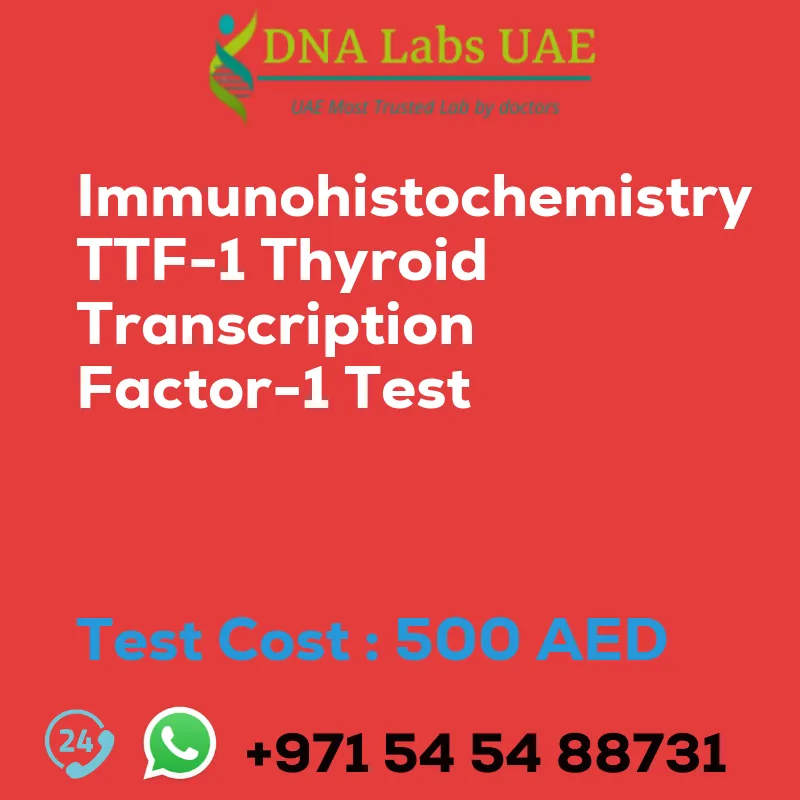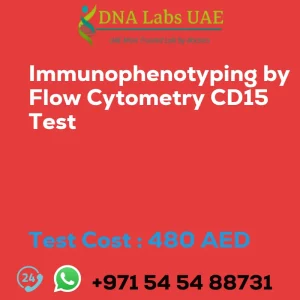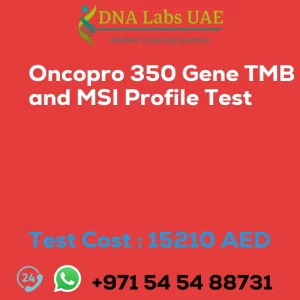IMMUNOHISTOCHEMISTRY TTF-1 THYROID TRANSCRIPTION FACTOR-1 Test
Test Name: IMMUNOHISTOCHEMISTRY TTF-1 THYROID TRANSCRIPTION FACTOR-1 Test
Components: TTF-1 protein detection
Price: 500.0 AED
Sample Condition: Submit tumor tissue in 10% Formal-saline OR Formalin fixed paraffin embedded block. Ship at room temperature. Provide a copy of the Histopathology report, Site of biopsy and Clinical history.
Report Delivery: Sample Daily by 6 pm; Report Block: 5 days Tissue Biopsy: 5 days Tissue large complex: 7 days
Method: Immunohistochemistry
Test Type: Cancer
Doctor: Oncologist, Pathologist
Test Department: N/A
Pre Test Information: Provide a copy of the Histopathology report, Site of biopsy and Clinical history.
Test Details
The TTF-1 (Thyroid Transcription Factor-1) test is an immunohistochemistry (IHC) test used to detect the presence of TTF-1 protein in cells. TTF-1 is a transcription factor that is primarily expressed in the thyroid gland, lung, and certain parts of the brain.
The test is commonly used in pathology to help differentiate between different types of tumors, particularly lung tumors. TTF-1 is highly expressed in lung adenocarcinomas, but not in other types of lung cancer such as squamous cell carcinoma. Therefore, a positive TTF-1 test result can be useful in confirming a diagnosis of lung adenocarcinoma.
In addition to lung cancer, the TTF-1 test can also be used in the diagnosis of thyroid tumors and certain types of brain tumors. It is typically performed on tissue samples obtained through biopsy or surgical resection.
The TTF-1 test is performed using an immunohistochemical staining technique. Tissue sections are treated with antibodies that specifically bind to TTF-1 protein. If TTF-1 is present in the tissue, the antibodies will bind to it and produce a visible staining reaction. The stained tissue sections are then examined under a microscope to determine the presence and pattern of TTF-1 expression.
Overall, the TTF-1 immunohistochemistry test is a valuable tool in the diagnosis and classification of certain types of tumors, particularly lung adenocarcinoma. It helps pathologists differentiate between different tumor types and provides important information for treatment planning and prognosis.
| Test Name | IMMUNOHISTOCHEMISTRY TTF-1 THYROID TRANSCRIPTION FACTOR-1 Test |
|---|---|
| Components | |
| Price | 500.0 AED |
| Sample Condition | Submit tumor tissue in 10% Formal-saline OR Formalin fixed paraffin embedded block. Ship at room temperature. Provide a copy of the Histopathology report, Site of biopsy and Clinical history. |
| Report Delivery | Sample Daily by 6 pm; Report Block: 5 days Tissue Biopsy: 5 days Tissue large complex : 7 days |
| Method | Immunohistochemistry |
| Test type | Cancer |
| Doctor | Oncologist, Pathologist |
| Test Department: | |
| Pre Test Information | Provide a copy of the Histopathology report, Site of biopsy and Clinical history. |
| Test Details |
The TTF-1 (Thyroid Transcription Factor-1) test is an immunohistochemistry (IHC) test used to detect the presence of TTF-1 protein in cells. TTF-1 is a transcription factor that is primarily expressed in the thyroid gland, lung, and certain parts of the brain. The test is commonly used in pathology to help differentiate between different types of tumors, particularly lung tumors. TTF-1 is highly expressed in lung adenocarcinomas, but not in other types of lung cancer such as squamous cell carcinoma. Therefore, a positive TTF-1 test result can be useful in confirming a diagnosis of lung adenocarcinoma. In addition to lung cancer, the TTF-1 test can also be used in the diagnosis of thyroid tumors and certain types of brain tumors. It is typically performed on tissue samples obtained through biopsy or surgical resection. The TTF-1 test is performed using an immunohistochemical staining technique. Tissue sections are treated with antibodies that specifically bind to TTF-1 protein. If TTF-1 is present in the tissue, the antibodies will bind to it and produce a visible staining reaction. The stained tissue sections are then examined under a microscope to determine the presence and pattern of TTF-1 expression. Overall, the TTF-1 immunohistochemistry test is a valuable tool in the diagnosis and classification of certain types of tumors, particularly lung adenocarcinoma. It helps pathologists differentiate between different tumor types and provides important information for treatment planning and prognosis. |








